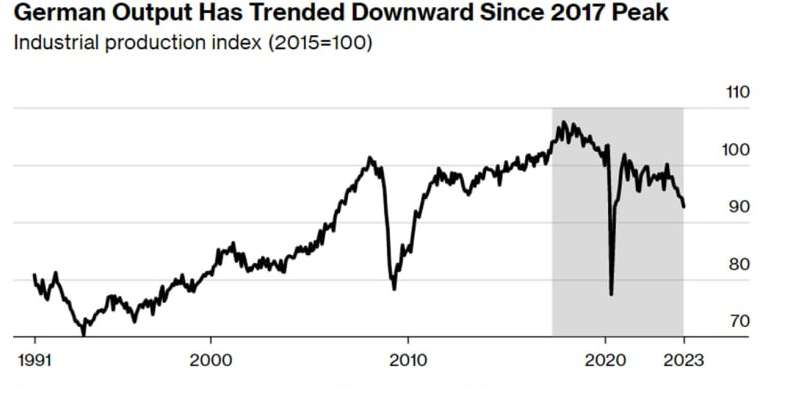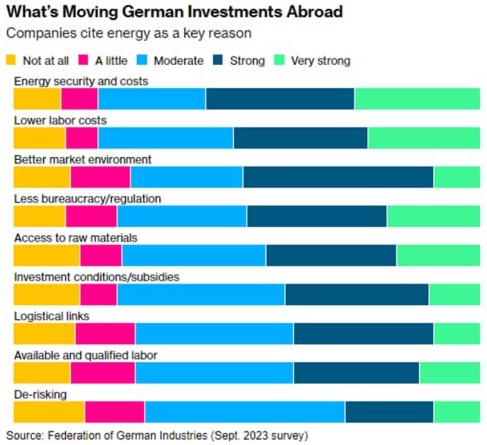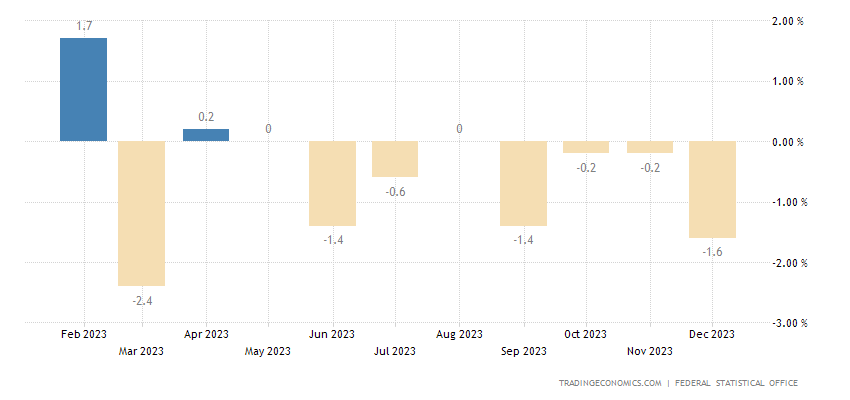Energy, bureaucracy and lack of financial incentives sing De Profundis to German industry

Even Bloomberg no longer holds back and sounds the death knell for German industry. Just yesterday we showed how German industrial production has not seen a positive value for a year now, so much so that even Italy, a land enemy of entrepreneurship, has managed to show better results than Berlin.
NowScholz is visiting Biden , in an attempt to bring him support in a politically difficult moment and to awaken attention to Ukraine, but these are no longer visits by Merkel, who arrived with a full wallet and a strong and rumbling. Now, however, it presents itself almost like a beggar, with an aged country far removed from the luster of the recent past. Today Scholz goes hat in hand, both asking for money for Ukraine and asking for a cut in American industrial contributions that are leading to the relocation of German industries overseas.
Industrial production is far from the highs of 2017, as can be seen from the following graph which highlights it, giving a value of 100 to 2015:
The reasons for the German industrial debacle
There are three main reasons for the crisis in German industry:
- Competition with the US: Government subsidies in the US are gaining momentum against the backdrop of Germany's inability to do anything to counter them. Furthermore, Washington provides energy at much lower costs than in Germany or Europe, and gas costs a fraction of what it costs in the EU;
- Competition with China, which also ceases to be an "insatiable" importer of German products, but, after having copied, improved and developed them, has become its main competitor, displacing Berlin on international markets;
- Loss of cheap Russian energy source, which affected energy-intensive sectors. Berlin had a competitive advantage over other European countries resulting from Russian energy supplies. With Nord Stream he had pushed it to the maximum, but now China and India are enjoying it, while the USA has very convenient internal sources
All this against the backdrop of political “paralysis” in Germany, labor shortages and the degradation of the education system. German entrepreneurs are very clear about the situation and put energy, bureaucracy and labor costs among the main reasons why it is necessary to leave Germany and invest elsewhere, as Bloomberg shows:
A huge energy problem
Energy has become the real drama of German industry, which relied heavily on energy-intensive sectors such as chemical and heavy industry. Subsidies are being phased out and energy prices for industry have more than doubled and are now among the highest in the EU and growing faster than in most countries.
only Italy has an industry that is more penalized from an energy point of view, but here chemistry is now secondary and the more energy-intensive industries have often made do. Over time, Italian industry has become lighter, precisely due to the abnormal burden of energy costs, linked to 30 years of wrong policies. Germany is, or rather was, very much based on chemistry, just think of Bayer and BASF, but this is now thinking of going elsewhere.
Goodbye industry
Although the downward movement occurs at different speeds depending on companies and industrial sectors with some sites closing production, others reducing volumes, others moving to other regions, production records a constant downward trend of – 1.6% m /m -3.0% y/y. On average, the industry declined by 1.5% in 2023, .
In energy-intensive industries, production fell in December by 5.8% m/m and 10.2% y/y; since December 2021 the decline has been 22.5%.
Although this sector is not of critical size (around 17% of production), the problem is rather that trends in the sector as a whole are persistently negative. In this regard, the German industry is becoming somewhat similar to the Japanese one, where rapid growth stopped in the 1990s, the peak of production was recorded again in 2007, after which production decreased by about 30 % at 1980s levels, including .H. against the backdrop of energy shortages due to Fukushima and the closure of nuclear power plants.
The difference is that however, Japan has compensated for the decline in exports and industry with large public investment programs and that, after a few years of closure, it has now resumed investing in nuclear power and has just started the reopening of some reactors. On the contrary, Berlin continues to push for an energy conversion that is expensive and for which it does not have the necessary basis, thus becoming increasingly dependent on expensive imports from abroad.
With these governments, German industry is going nowhere.

Thanks to our Telegram channel you can stay updated on the publication of new Economic Scenarios articles.
The article Energy, bureaucracy and lack of financial incentives sing the De Profundis to German industry comes from Scenari Economici .
This is a machine translation of a post published on Scenari Economici at the URL https://scenarieconomici.it/energia-burocrazia-e-mancanza-di-incentivi-finanziari-cantano-il-de-profundis-allindustria-tedesca/ on Sat, 10 Feb 2024 10:00:01 +0000.




